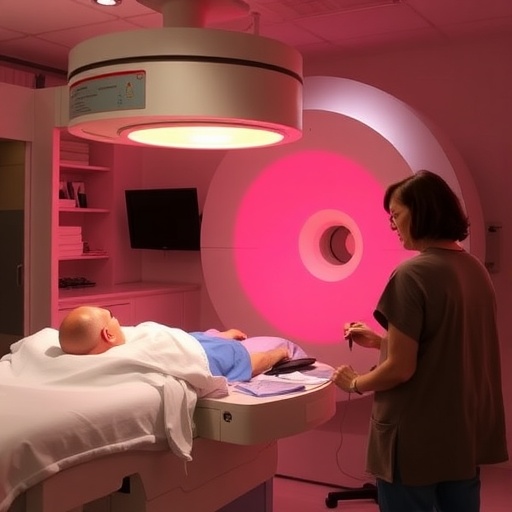In the realm of oncology, few challenges are as formidable as managing recurrent retroperitoneal sarcomas, particularly in cases where surgical intervention is not feasible. These tumors, notorious for their capacity to expand aggressively within the retroperitoneal space, pose significant treatment dilemmas due to their proximity to critical organs and their inherent resistance to radiation therapy. Traditional radiotherapeutic approaches demand delivery of high doses to overcome tumor radioresistance, yet such intensification invariably risks severe collateral damage to adjacent healthy tissues, including the small intestine and other vital structures. Compounding this difficulty is the limitation imposed once a patient has undergone an initial course of radiation, effectively narrowing the therapeutic window for subsequent radiotherapy due to accumulated toxicity constraints.
A groundbreaking pilot study emanating from researchers at the Fox Chase Cancer Center, recently unveiled at the 2025 American Society for Radiation Oncology (ASTRO) Annual Meeting, introduces a transformative approach that may redefine radiotherapy paradigms for recurrent retroperitoneal sarcomas and potentially other challenging malignancies. This innovative methodology employs CT adaptive stereotactic body radiation therapy (CTA-SBRT), harnessing advanced imaging and real-time treatment adaptation to safely administer repeat courses of radiation without compromising patient safety or quality of life.
The study, spearheaded by fifth-year radiation oncology resident Dr. Maryanne J. Lubas and overseen by Dr. Rebecca Shulman, Assistant Professor of Radiation Oncology at Fox Chase, meticulously analyzed clinical outcomes from five patients treated with this adaptive re-irradiation technique between April 2024 and January 2025. Crucially, the treatment protocol involved the creation of dual radiation plans each session: a conventional plan formulated prior to therapy and a second, dynamically optimized adaptive plan generated based on same-day cone-beam CT imaging. Across all treatment sessions, the adaptive plan consistently demonstrated superior dosimetric performance, enabling enhanced precision targeting of tumorous tissue while minimizing exposure to surrounding healthy structures.
This adaptive process leverages the Ethos cone-beam CT system integrated with sophisticated artificial intelligence algorithms capable of recalibrating radiation dose distribution in real time. By allowing on-the-fly adjustments to the treatment plan while the patient remains immobilized on the treatment couch, clinicians can rapidly respond to minute anatomical changes, such as tumor regression, patient weight fluctuations, or internal organ motion. The result is a significant improvement in therapeutic ratio—amplifying tumoricidal doses by an average of 7.7% while concomitantly reducing the radiation burden on critical organs such as the small intestine by approximately 21%.
Perhaps most strikingly, this pioneering application of CTA-SBRT achieved excellent safety profiles. Patients tolerated the adaptive re-irradiation without any serious adverse events or the need for emergency surgical interventions, thereby preserving essential physiological functions including bowel and bladder control. This outcome underscores a paradigm shift from merely providing palliative benefit towards achieving durable control of these notoriously recalcitrant tumors, which was hitherto almost unattainable with conventional radiation strategies.
The successful integration of adaptive radiation therapy reflects a convergence of cutting-edge imaging, computational power, and clinical expertise. Traditional radiation oncology paradigms have long been hampered by rigid treatment plans developed prior to therapy initiation, which do not accommodate the dynamic biological and spatial changes occurring during a multiday treatment course. Adaptive therapy surmounts this limitation by iterative plan optimization at each visit, ensuring that radiation delivery conforms to the current tumor morphology and anatomical context with remarkable fidelity.
Fox Chase Cancer Center’s commitment to advancing adaptive radiotherapy extends well beyond retroperitoneal sarcomas. As pioneers in this discipline, they were the first institution nationally to initiate a prostate cancer clinical trial deploying this technology. Over the past year, their cohort has broadened considerably, now encompassing complex cancers of the bladder, liver, pancreas, breast, lung, and head and neck. This expansive implementation attests to the adaptability and broad applicability of the Ethos platform and AI-driven treatment planning in diverse oncologic scenarios.
Achieving this level of adaptive precision required immense institutional investment in infrastructure, cross-disciplinary training, and collaborative workflows. Every radiation oncologist at Fox Chase is extensively trained to offer adaptive therapy as a frontline option for eligible patients, working seamlessly with a dedicated cadre of PhD medical physicists who execute real-time plan recalibrations alongside clinicians within the linear accelerator treatment suite. This tightly integrated model exemplifies how multidisciplinary synergy can catalyze technological innovation into tangible patient benefits.
The implications of this technology extend far beyond technical refinement; they herald an era in which radiation therapy is truly personalized and dynamically tailored, shifting the therapeutic paradigm from a one-size-fits-all model to a continuously evolving, patient-specific intervention. This approach not only enhances the efficacy of oncologic control but also significantly mitigates toxicities that historically limited repeat treatments, thereby expanding options for patients previously considered untreatable.
Looking forward, the Fox Chase team plans to longitudinally monitor patients enrolled in the retroperitoneal sarcoma pilot study while simultaneously expanding clinical trials to validate adaptive radiation therapy across a wider spectrum of malignancies. Their pioneering work lays a foundation for reimagining cancer treatment as a responsive, adaptive process — an innovation that could dramatically improve outcomes and quality of life for countless patients confronting the daunting challenge of recurrent or resistant tumors.
As radiation oncology continues to evolve at the nexus of technology, biology, and clinical medicine, adaptive radiotherapy epitomizes the future: a marriage of precision imaging, artificial intelligence, and expert human oversight that redefines what is possible in cancer care. This breakthrough study is not merely an incremental step but a leap forward, suggesting that where standard treatment once reached its limits, new adaptive modalities can forge paths toward hope, control, and potentially even cure in some of the most challenging oncologic landscapes.
Subject of Research: People
Article Title: (Not provided)
News Publication Date: 28-Sep-2025
Web References: Fox Chase Cancer Center, ASTRO 2025 Annual Meeting
References: (Not provided)
Image Credits: (Not provided)
Keywords: Sarcoma, Cancer




